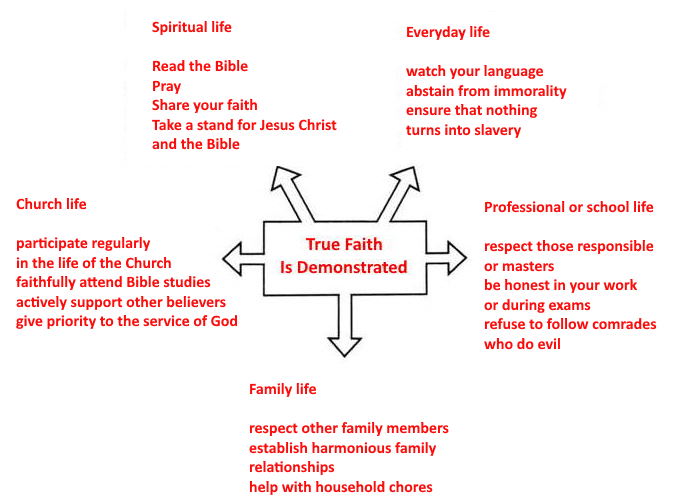choose to select from more
than 250 languages for instant
translation of the information presented.



Living The Christian Life
Faith
1. Definition
2. The source of faith
3. The object of faith
4. The reality of faith
5. The necessity of faith
6. The blessings of faith
7. The test of faith
# For Further Study
1. Definition
Faith is the attitude of man who accepts and holds realities that are now invisible, either because they are to come in the future or because they escape experimental knowledge (Hebrews 11:1)
Faith is also at the same time an act by which man voluntarily surrenders to God, recognizing him as faithful and capable of keeping his promises.
(Psalm 17:1-6) (Romans 4:21) (Hebrews 11:11) (Romans 10:11)The literal meaning of the Greek verb translated as "to believe" or "to have faith" is: to adhere to, to put one's trust, to confide. The Old Testament most often uses the Hebrew expression "to confide", but also "to rely on" and "to expect".
2. The Source of Faith
Faith proceeds from the revelation that God gives of man to himself.
(Romans 10:17)(Hebrews 1:1-2)
Faith rests on the affirmations of Scripture.
(John 20:31)To create faith, God uses human instruments which collaborate with the Spirit and the Word of God ( Ro 10: 14-17 ; John 17:20 ; John 16: 8 ; cf. John 4: 39-42 ) .
Faith is based on knowledge: you have to know something about God to trust him ( Ro 10: 14b ). God does not ask to believe without discernment and without reflection. Faith is a response to the statements of the Gospel ( Eph 1:13 ; 1 Cor 15: 1-4 ).
3. The object of faith
Faith has a content ( 2 Ti 1: 12b ); it is not an objectless mysticism.
The object of faith is a Person: God himself , which includes the Person of Jesus Christ ( Ro 4:17 ; Mk 11:22 ; Jn 14: 1 ; Jn 1: 12a ; 1 Jn 2:23 ; 1 Pi 1:21 ).
Faith also relates to the words and acts of God ( Jn 12: 47-48 ; Jn 10: 25-26 , Jn 10:38 ; Jn 2:22 ; Jn 15:22 ; Jn 15:24 ; cf. Jn 4:50 ).
It is not enough just to believe something about God (his existence, his power, etc.) or to believe in biblical doctrines (the afterlife, creation, grace, etc.) ( Ja 2: 19 ) but it is also a matter of believing "in his name", that is to say in everything that represents the Person and the work of Jesus Christ and of welcoming him ( Jn 1: 12a ; Jn 17: 20-21 ; Rev 3:20 ).
4. The reality of faith
True faith, authentic faith, is demonstrated by visible acts which manifest its reality ( James 2: 14-17 ; 1 Th 1: 8 ; Titus 1:16 ; cf. Mt 14: 26-29 ).
True faith binds man in that he freely submits to and obeys God ( Romans 1: 5 ; Romans 6:17 ; cf. James 1: 22-25 ).

5. The necessity of faith
Faith is essential to obtain salvation as well as to progress in the Christian life ( Ephesians 2: 8 ; Hebrews 11: 6 ; Hebrews 10:38 ; Hebrews 6: 11-12 ; Col 2: 6-7 ). Faith is the only way to benefit from the work of Christ ( Romans 3:28 ).
6. The blessings of faith
It is by faith that man receives many blessings:
he benefits from the work of Jesus Christ and the promises of God ( Heb 6:12 ; Gal 3: 6-8 ; 2 Cor 1:20 );
He is justified ( Ga 2:16 ; Ac 13: 38-39 ) and receives eternal life ( Jn 3:16 ; Jn 5:24 );
he receives the Holy Spirit ( Ga 3: 2 );
he has the freedom to draw near to God and to enter into communion with Him ( Eph 3:12 ; Heb 10:22 ; 1 Jn 1: 3b , 1 Jn 1: 7 );
he receives answered prayers ( Mt 21:22 );
he can resist the devil and become victorious over sin ( 1 Pi 5: 8-9 ; Eph 6:16 ; 1 Jn 5: 4 );
he is kept by the power of God ( 1 Pi 1: 5 ).
7. The test of faith
God allows the temptation to purify the faith, to bring out what is truly authentic.
The test of faith is intended to perfect and strengthen the believer ( 1 Pi 1: 6-7 ; Ja 1: 2-4 ).
Note. The temptation will be seen in point 3-4-1 . and other difficulties at 3-4-2